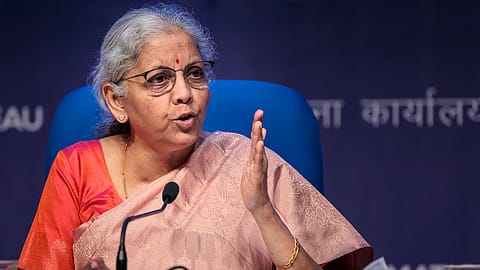Need 8% GDP growth to reach developed economy goal: Nirmala Sitharaman
FM said the issues being faced at present are not a temporary disruption, but a structural transformation and the omnipresent uncertainty is the new norm.

Finance minister Nirmala Sitharaman today said India needs to grow at a sustained rate of 8% to reach developed economy goals by 2047.
“India taking a twin track approach to seeking prosperity. One of the track is India's Viksit Bharat Goal by 2047 set up by Prime Minister Narendra Modi. The second track being how to reach there, for which India has adopted the policy self-reliance and Atmanirbhar as laid by Prime Minister Narendra Modi,” Sitharaman said in her address on the theme ‘Seeking Prosperity in Turbulent Times’ at the Kautilya Economic Conclave 2025 in New Delhi today.
“So, the twin track is ready before us. And we cannot go on at GDP growth speed of 4% or 5% or 5.5%. 8% GDP growth will give us the speed to reach the destination by 2047,” FM added. She clarified that it does not mean we want to shut our economy for the outside world and look inward.
FM said this is an era of unprecedented global uncertainty and volatility. FM said the theme before us, 'Seeking prosperity in turbulent times', mirrors the aspirations of each nation and the world as a whole.
She pointed out that the very foundations of the global order are shifting beneath our feet. The world that emerged after the end of the Cold War, which led to the expansion of globalisation, open markets, and the pursuit of multilateral cooperation, now appears to be a relic of the past. For three decades, a contested equilibrium allowed nations to pursue prosperity through integration and interdependence. That equilibrium has inevitably been upended, and the rules of international engagement are being rewritten.
Stating that the present is ‘turbulent’, in some sense, would be to understate the scale of the challenge at hand, FM pointed out, “Dislocations define this new era. The international order is morphing. Trade flows are being reshaped, alliances are being tested, investments are being rerouted along geopolitical lines, and shared commitments are being re-examined.”
FM said the issues being faced at present are not a temporary disruption, but a structural transformation and the omnipresent uncertainty is the new norm. The rapidity of events unfolding ensures that the world we wake up to often feels different from the one we went to sleep with. “Shifts that once transpired over decades are now condensed into months or even weeks. And tangled within these are policymakers, wrestling with unforeseen challenges, searching for a new equilibrium,” she said.
